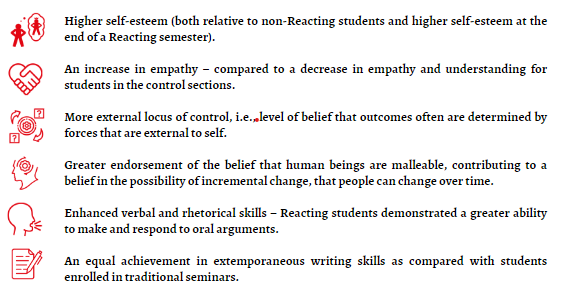WHAT IS REACTING? |
Reacting to the Past is an active-learning pedagogy of complex role-playing games. Reacting promotes engagement with big ideas, and improves critical, practical, intellectual, and academic skills. |
HOW DOES REACTING WORK?Class sessions are run by students. Instructors advise students, and grade their oral and written work. Reacting roles and games do not have a fixed script or outcome. This is not re-enacting. In Reacting games, students are assigned character roles with specific goals and must communicate, collaborate, and compete effectively to advance their objectives. While students are obliged to adhere to the philosophical and intellectual beliefs of the figures they have been assigned to play, as well as the context and facts of the historical moment, they must devise their own means of expressing those ideas persuasively in papers, speeches, or other public presentations. Students must pursue a course of action to try to win the 'game.' Students learn by
THE IMPACT OF USING A REACTING TO THE PAST GAME
These results were pulled from a study on the efficacy of Reacting to the Past conducted from 1999-2006. For the full study, please see Stroessner et al., “All the World’s a Stage? Consequences of a Role-Playing Pedagogy on Psychological Factors and Writing and Rhetorical Skill in College Undergraduates,” Journal of Educational Psychology 101 (2009), 605–620. COMPONENTS OF A REACTING TO THE PAST GAME Regardless of the subject matter or level of development, every Reacting to the Past game includes the following components:
Additionally, different games have various additional pieces, ranging from financial documents to balloting sheets to optional modules that complicate and enrich the standard game rules. |
JOIN THE REACTING CONSORTIUM
We're a committed and supportive community. What are you waiting for? Join today.

